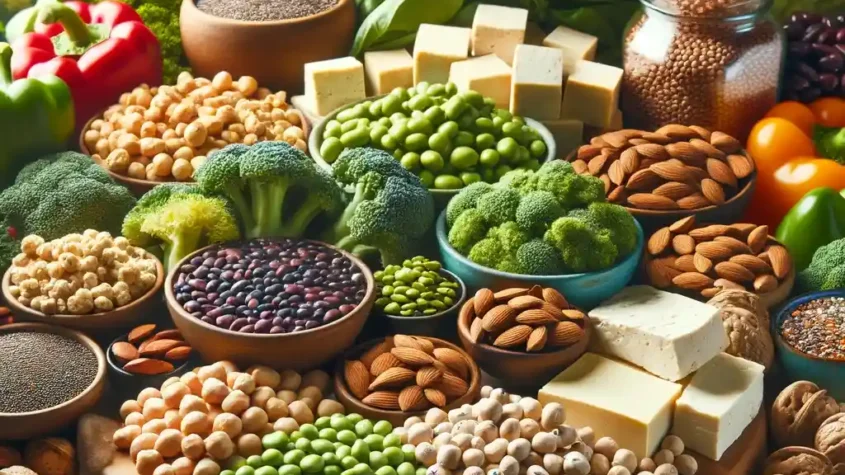
Vegetarian diets can provide all the necessary protein through a variety of sources. With options such as legumes, nuts, seeds, and whole grains, individuals can meet their protein needs without consuming meat. Exploring wellhealthorganic.com:vegetarian protein sources not only promotes health but also supports sustainable eating habits.
Many people may overlook the protein potential found in vegetables and grains. Foods like quinoa, lentils, and chickpeas are not only high in protein but also rich in other essential nutrients. This blog post will highlight various vegetarian protein sources and offer practical ways to incorporate them into daily meals.
Understanding the variety and nutritional value of vegetarian proteins can empower those looking to transition to a meat-free diet. By recognizing how to balance these protein sources, they can enjoy diverse and satisfying meals while maintaining optimal health.
Fundamentals of Vegetarian Nutrition
Vegetarian nutrition focuses on the balance of essential nutrients to maintain health. Protein is a critical component that requires careful attention, especially in plant-based diets. Understanding the types of proteins and their sources aids in achieving a well-rounded vegetarian diet.
Understanding Protein Essentials
Protein is vital for numerous bodily functions, including muscle repair, enzyme production, and immune support. For vegetarians, it is essential to consume a variety of protein sources to meet daily requirements.
The Recommended Dietary Allowance (RDA) for protein varies by age and activity level but is generally around 46 grams per day for women and 56 grams for men.
Key vegetarian protein sources include:
- Legumes: lentils, chickpeas, and beans.
- Nuts and Seeds: almonds, sunflower seeds, and chia seeds.
- Whole Grains: quinoa, brown rice, and oats.
- Dairy and Eggs: for lacto-ovo vegetarians.
Combining different sources can help maximize protein intake.
Complete Vs. Incomplete Proteins
Proteins are categorized as complete or incomplete based on their amino acid composition. Complete proteins contain all nine essential amino acids necessary for human health.
Animal-based foods, including meat, eggs, and dairy, are complete protein sources. For vegetarians, key complete proteins include:
- Quinoa
- Soy products: tofu, tempeh, and edamame
- Chia seeds
Incomplete proteins lack one or more essential amino acids. Most plant-based proteins fall into this category. Examples include:
- Rice
- Beans
- Peas
To ensure adequate amino acid intake, vegetarians should combine incomplete proteins. For example, pairing rice with beans provides a complete amino acid profile.
Top Vegetarian Protein Sources and Benefits
Vegetarian diets can be rich in protein when incorporating a variety of sources. Legumes, nuts, grains, dairy, and plant-based alternatives offer essential nutrients and are versatile for meal planning.
Legumes and Lentils
Legumes, including beans, chickpeas, and lentils, are excellent protein sources. A cup of cooked lentils provides approximately 18 grams of protein. They are also high in fiber, which aids in digestion and promotes satiety.
In addition to protein, legumes supply essential vitamins and minerals, such as iron and folate. Their low cost and easy preparation make them a staple in vegetarian diets. They can be included in soups, stews, salads, or served as a side dish.
Nuts and Seeds
Nuts and seeds are nutrient-dense protein sources, rich in healthy fats and antioxidants. For instance, an ounce of almonds contains about 6 grams of protein. Additionally, they are great sources of vitamin E, magnesium, and other essential nutrients.
Incorporating a variety of nuts and seeds, such as chia, flaxseeds, and walnuts, into the diet can enhance protein intake. They can be consumed as snacks, added to smoothies, or sprinkled on salads and yogurt for extra crunch and nutrition.
Whole Grains and Cereals
Whole grains like quinoa, brown rice, and oats provide significant protein levels along with complex carbohydrates. Quinoa, for example, contains about 8 grams of protein per cup and is complete, meaning it includes all nine essential amino acids.
Whole grains are also abundant in dietary fiber and can help regulate blood sugar levels. They serve as excellent bases for salads, side dishes, or breakfast options, providing both energy and nutrition for the day.
Dairy and Plant-Based Alternatives
Dairy products, such as Greek yogurt, cottage cheese, and cheese, offer substantial protein content. A cup of Greek yogurt has approximately 20 grams of protein and is loaded with probiotics, benefiting gut health.
Plant-based alternatives, like almond milk and soy yogurt, are increasingly popular. Soy products, in particular, can provide a protein content comparable to dairy. These alternatives cater to diverse dietary needs and can be easily incorporated into various meals and snacks.
Gold Belt Buckle: A Timeless Accessory for Every Occasion
The gold belt buckle has long been a symbol of status, craftsmanship, and personal style. …









